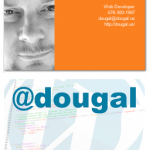If you looked closely at the business card image in my previous post, you might have noticed that the URL on the card isn’t for this blog. I set up a separate portfolio site using the dougal.us domain that I’ve been sitting on for quite some time. I am currently using the SimpleFolio theme, found from Smashing Magazine, and created portfolio highlight posts for several projects I’ve been involved in. I’m still not sure if I’m going to stay with that theme, but it’s likely to stick around for at least a little while, until I have time to decide what I might want to do differently. The “logo” is temporary — I haven’t settled on an identity, yet — so that’s likely to change, as well.
This site will continue to host most of my WordPress-related posts, plugin information, and occasional personal posts, while the other site will cover other web site projects that I work on, speaking gigs, general web development topics, and tech news. There will be some overlap from time-to-time (in particular with information about WordPress projects, conferences, and presentations), but I’ll try to keep it minimal, mainly pointing from one site to the other, as appropriate.





